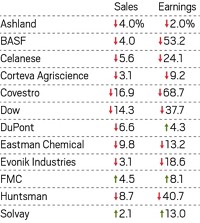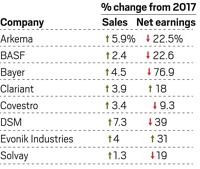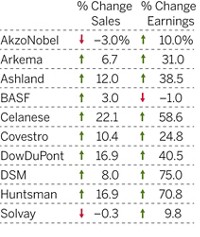Advertisement
Grab your lab coat. Let's get started
Welcome!
Welcome!
Create an account below to get 6 C&EN articles per month, receive newsletters and more - all free.
It seems this is your first time logging in online. Please enter the following information to continue.
As an ACS member you automatically get access to this site. All we need is few more details to create your reading experience.
Not you? Sign in with a different account.
Not you? Sign in with a different account.
ERROR 1
ERROR 1
ERROR 2
ERROR 2
ERROR 2
ERROR 2
ERROR 2
Password and Confirm password must match.
If you have an ACS member number, please enter it here so we can link this account to your membership. (optional)
ERROR 2
ACS values your privacy. By submitting your information, you are gaining access to C&EN and subscribing to our weekly newsletter. We use the information you provide to make your reading experience better, and we will never sell your data to third party members.
Business
Europe’s Firms Back On Track
Chemical Earnings: Economic growth powers fourth-quarter rebound
by Melody M.Bomgardner
March 7, 2011
| A version of this story appeared in
Volume 89, Issue 10
European chemical companies report that strong sales in the fourth quarter of 2010 finally brought business back to prerecession levels. Most firms reported at least a 10% increase in sales compared with the 2009 fourth quarter.
For AkzoNobel, Arkema, Clariant, and DSM, the earnings picture in the final quarter of 2010 was dramatically positive compared with deep losses in the same quarter the previous year.
Helped by sales that grew 32.4%, Arkema turned a $20 million loss in the 2009 quarter into earnings of $77 million in the same period in 2010. The French firm reported that its performance products business benefited from demand recovery in markets such as automotive, oil and gas, packaging, and cable. But soft demand for polyvinyl chloride from the construction industry continued to hold back Arkema’s vinyl division.
Meanwhile, DSM recorded earnings of $199 million for the quarter compared with a loss of $60 million in 2009. “I am proud to report such strong financial results for 2010, which reflect our focus on innovation and our customers across the globe as well as cost and cash management supported by an improving economic climate,” DSM CEO Feike Sijbesma told investors.
All of DSM’s segments improved during 2010, the company said, except for pharmaceuticals. The company saw steep growth in its performance materials business, which enjoyed a 34.4% year-over-year sales increase. In addition, sales of polymer intermediates shot up 44.0% because of both increased production volumes and higher prices.
Similarly at Bayer, chemicals-related businesses boosted sales for the quarter, whereas the pharmaceuticals segment was the laggard. Bayer MaterialScience increased production volumes 12.8% and prices 8.8% in the quarter, gains the company attributed to growth in demand from key customer industries. “This applies particularly to the automotive and electronics sectors and, in some regions, to the construction industry as well,” CEO Marijn Dekkers said.
In contrast, Bayer’s pharmaceutical business was beset by problems such as competition from generics. Generics also took a bite from the firm’s crop science division, particularly Bayer’s herbicide sales. Still, Bayer was able to raise overall sales by 14.5%.
But extraordinary items gutted Bayer’s earnings for the fourth quarter. The company wrote off $541 million to retire the Schering brand. And it set aside a staggering $703 million for litigation costs for lawsuits by U.S. farmers who claim damages caused by the appearance of genetically modified rice strains in their crops. Bayer was developing strains containing herbicide-resistance genes in a lab at Louisiana State University. The presence of the genes in rice crops led Japan and the European Union to ban rice imports from the U.S.
At BASF, strong growth in chemical demand pushed quarterly revenues to $21.9 billion, a 24.7% increase from the previous year’s quarter. “We achieved record sales and earnings in 2010,” Chairman Jürgen Hambrecht boasted. “In the chemicals business, in particular, we were able to take advantage of the strong economic recovery in 2010, which was more dynamic than we all initially expected.”
European chemical executives forecast that strong economic growth will continue through 2011 and vow to raise prices to stay ahead of rising raw-materials costs. BASF, which has its own oil and gas division, will benefit from both the expanding economy and higher oil prices, Richard Logan, a chemicals analyst at Goldman Sachs, wrote in a note to investors. “We believe there is clearly scope for further earnings growth at BASF in 2011,” he added.








Join the conversation
Contact the reporter
Submit a Letter to the Editor for publication
Engage with us on Twitter